

A universal undertaking - Australian Catholics. Task 2 PowerPoint. What Is Social Justice? 1309 HousingLitRev. 4714.0 - National Aboriginal and Torres Strait Islander Social Survey, 2014-15. Key Aboriginal & Torres Strait Islander data released The Australian Bureau of Statistics (ABS) has released the findings of a major survey about Aboriginal and Torres Strait Islander Australians - highlighting key improvements in education, health, and housing.
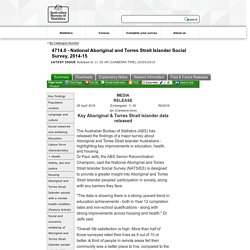
Dr Paul Jelfs, the ABS Senior Reconciliation Champion, said the National Aboriginal and Torres Strait Islander Social Survey (NATSISS) is designed to provide a greater insight into Aboriginal and Torres Strait Islander peoples' participation in society, along with any barriers they face. Homelessness among Indigenous Australians. It is well known that Indigenous people are over-represented in the homeless population.
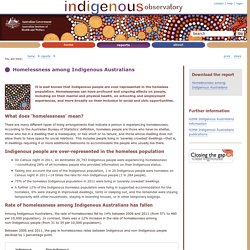
Homelessness can have profound and ongoing effects on people, including on their mental and physical health, on schooling and employment experiences, and more broadly on their inclusion in social and civic opportunities. What does 'homelessness' mean? There are many different types of living arrangements that indicate a person is experiencing homelessness. According to the Australian Bureau of Statistics’ definition, homeless people are those who have no shelter, those who live in a dwelling that is inadequate, or has short or no tenure, and those whose dwelling does not allow them to have space for social relations.
This includes people living in ‘severely crowded’ dwellings—that is, in dwellings requiring 4 or more additional bedrooms to accommodate the people who usually live there. Indigenous people are over-represented in the homeless population More information. Homelessness. A profile of homelessness for Aboriginal and Torres Strait Islander people Higher rates of homelessness among Aboriginal and Torres Strait Islander people Compared with non-Indigenous Australians, Indigenous people: had four times the rate of homelessness (191 per 10,000 compared with 49 per 10,000 in the 2006 Census) made up 9% of the total homeless population (Indigenous people make up around 2.5% of the whole Australian population).
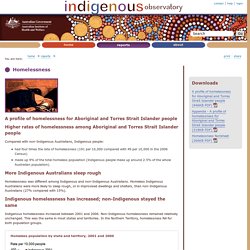
More Indigenous Australians sleep rough. The Gap: Indigenous Disadvantage in Australia. In 2008, the Australian government made a formal commitment to address Indigenous disadvantage in Australia, known as 'Closing the Gap', but what is the “gap”?
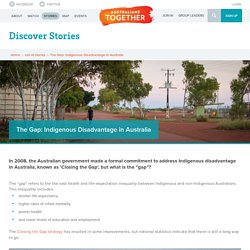
The “gap” refers to the the vast health and life-expectation inequality between Indigenous and non-Indigenous Australians. This inequality includes: shorter life expectancy higher rates of infant mortality poorer health and lower levels of education and employment. Some economic effects of inequality. Dr Anne Holmes, Economics Defining inequality Economic inequality means unequal access to wealth and income.
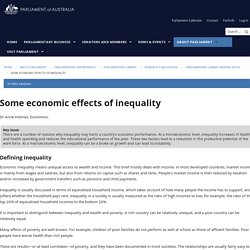
This brief mostly deals with income. In most developed countries, market income is mainly from wages and salaries, but also from returns on capital such as shares and rents. People's market income is then reduced by taxation and/or increased by government transfers such as pensions and child payments. Inequality – ACOSS. Excessive inequality is a problem for any society.
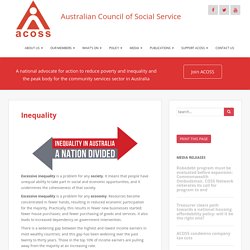
It means that people have unequal ability to take part in social and economic opportunities, and it undermines the cohesiveness of that society. Excessive inequality is a problem for any economy. Resources become concentrated in fewer hands, resulting in reduced economic participation for the majority. Practically, this results in fewer new businesses started; fewer house purchases; and fewer purchasing of goods and services.
Sustainable Development Goals. Sustainable Development Goals End poverty in all its forms everywhere End hunger, achieve food security and improved nutrition and promote sustainable agriculture. What Does Social Justice Mean to YOU? Iversal Declaration of Human Rights. Preamble Whereas recognition of the inherent dignity and of the equal and inalienable rights of all members of the human family is the foundation of freedom, justice and peace in the world, Whereas disregard and contempt for human rights have resulted in barbarous acts which have outraged the conscience of mankind, and the advent of a world in which human beings shall enjoy freedom of speech and belief and freedom from fear and want has been proclaimed as the highest aspiration of the common people, Whereas it is essential, if man is not to be compelled to have recourse, as a last resort, to rebellion against tyranny and oppression, that human rights should be protected by the rule of law, Whereas it is essential to promote the development of friendly relations between nations, Whereas Member States have pledged themselves to achieve, in co-operation with the United Nations, the promotion of universal respect for and observance of human rights and fundamental freedoms, Article 1.
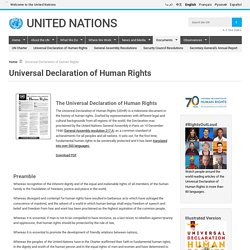
Article 2. Universal Declaration of Human Rights - Illustrated Version. Voices on Social Justice. Fact Sheets. Explore Catholic Social Teaching Principles. Housing, homelessness and human rights. What does homelessness have to do with human rights?
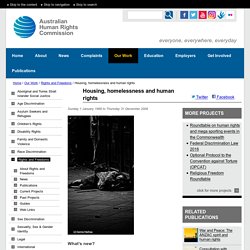
People experiencing homelessness face violations of a wide range of human rights. Access to safe and secure housing is one of the most basic human rights. However, homelessness is not just about housing. A person who is homeless may be facing violations of the right to an adequate standard of living, the right to education, the right to liberty and security of the person, the right to privacy, the right to social security, the right to freedom from discrimination, the right to vote and many more. Home - Australian Catholic Social Justice Council. Home - Institute for Social Justice. Examples and Solutions.
Social justice issues can occur in relation to practically any aspect of society where inequality can arise as a result of unjust prejudices or policies.
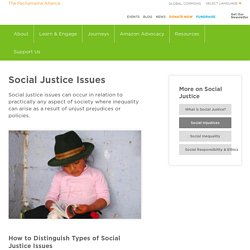
Social justice issues can be delineated into two categories, although they are often co-dependent: Inter-Social Treatment and Unequal Government Regulation. Issues - Australian Catholic Social Justice Council. Print Workplace Justice | Trade Justice | World Poverty | Social security ‘Within an unjust economic system marked by significant structural inequities, the situation of the marginalised is daily becoming worse.
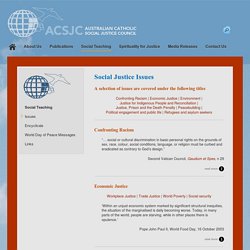
Today, in many parts of the world, people are starving, while in other places there is opulence.’ Social Justice. Social justice means being entitled to the same rights and services as all other citizens. Breastplate - Cora Gooseberry B008454 Photographer: Stuart Humphreys © Australian Museum These rights have been difficult to achieve for Aboriginal and Torres Strait Islanders because of a history of governmental and colonial racism.
What is social justice? "Social justice is what faces you in the morning. Social Justice Issues - Diocese of Gaylord. The following are resources and links on international and national social justice issues for Catholic educators. Abortion "Human life must be respected and protected absolutely from the moment of conception. From the first moment of his existence, a human being must be recognized as having the rights of a person - among which is the inviolable right of every innocent being to life. *Catechism of the Catholic Church #2270 USCCB Pro-Life Activities The Secretariat of Pro-Life Activities, under the guidance and direction of the Committee on Pro-Life Activities, works to teach respect for all human life from conception to natural death, and organize for its protection.
Project Rachel - National Project Rachel, a ministry of healing and reconciliation, seeks to serve any one who suffers psychologically and spiritually from an abortion. Assisted Suicide "Those whose lives are diminished or weakened deserve special respect. 182820 15 FACTSHEET Social Justice and Health. Explore Catholic Social Teaching Principles. From the Secretariat August 2018 - Australian Catholic Social Justice Council. Dear Friends The Australian Catholic Bishops’ Social Justice Statement for 2018–19, A Place to Call Home: Making a home for everyone in our land, calls on all Australians to look beyond the immediate challenges of high housing and rental costs on the average household budget, to consider the lot of those who are homeless or at serious risk of becoming homeless. In a letter to all Catholic parishes and church communities of Australia, the President of the Australian Catholic Bishops Conference has promoted this Statement and highlighted the critical issue of homelessness – the damage it does to individuals and families and the harm it does to the social fabric of a community that still champions the notion of a ‘fair go’.
‘It seems hard to believe that in a rich nation such as ours, the latest Census figures show that the number of Australians who are homeless has grown to more than 116,000. The bishops quote a young man who is homeless. He says: This is a wake-up call. International Social Justice Commission: A Social Justice Perspective on Poverty. It is commonly cited that well over one billion people must survive on less than US$1.25 a day1. Intermittent natural disasters and armed conflicts rightfully break our hearts and inspire collective acts and outcries of compassion. Yet children die, literally in their tens of thousands, every single day – simply because they are born into situations where their parents have no opportunities to adequately provide for their health and well-being2.
The extreme deprivation of such a large proportion of the world’s population, in a world with more than enough resources to cover everyone’s basic needs, is a grave injustice. As followers of Jesus, we are compelled to address the issue. Living out our Biblical mandate means, among other things, that we must tackle the issue of extreme global poverty. The United Nations’ Millennium Development Goal 13 aspires to a significant contribution towards “eradicating extreme poverty and hunger.” Global Issues Creating Poverty. The Poverty of Social Justice.